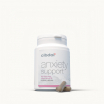Can ashwagandha stop overthinking?
Last updated:
Published:
Are you tired of your mind constantly racing with thoughts? Wondering if there's a way to quiet the chaos and find some peace? Well, studies have shown that ashwagandha, along with other ayurvedic methods and herbs like chamomile and valerian root, might just be the solution you've been searching for. Overthinking can take a toll on our mental health, but research suggests that these powerful herbs could offer significant reduction in excessive thinking.
Contents:
- Reducing symptoms of anxiety and depression
- Promoting overall mental well-being
- Incorporating ashwagandha into a daily routine for managing overthinking
- Ashwagandha's Impact on Reducing Anxiety and Stress
- Enhancing cognitive function with ashwagandha
- The role of ashwagandha in promoting relaxation and better sleep
- Can ashwagandha stop overthinking?
A systematic review of various studies has explored the effects of ashwagandha, an adaptogenic herb, on overthinking. The results show that ashwagandha, an ayurvedic method, has the potential to calm the mind and lower excessive thinking. So, if you're looking for herbal remedies to help ease your racing thoughts, ashwagandha may be worth considering along with chamomile.
With its growing popularity and positive feedback from users, it's clear that ashwagandha, along with other ayurvedic methods and herbs like chamomile and valerian root, is making waves as an effective tool against overthinking. In the following sections, we will delve deeper into the research behind these remarkable herbs and explore how they can bring tranquility to your mind. So let's dive in and discover how ashwagandha, chamomile, and valerian root may just be your ticket to a calmer state of being.

Potential benefits of ashwagandha for mental health
Ashwagandha, a powerful herb with a long history in traditional Ayurvedic medicine, is believed to offer numerous potential benefits for mental health. Its adaptogenic properties, along with other herbs like valerian, chamomile, and kava, make it an attractive option for those seeking natural support for their overall well-being. Let's explore some of the ways in which ashwagandha, valerian, chamomile, and kava may positively impact mental health.
Reducing symptoms of anxiety and depression
Studies have indicated that ashwagandha, an adaptogenic herb, has the potential to alleviate symptoms associated with anxiety and depression. These two conditions can significantly impact mental health, often leading to feelings of sadness, hopelessness, and persistent worry. Ashwagandha's ability, along with valerian and kava, to modulate stress responses in the body may help reduce anxiety levels and improve mood.
One study involving individuals with chronic stress found that consuming ashwagandha root extract, kava, and valerian led to significant reductions in anxiety scores compared to a placebo group. Another study focusing on individuals with moderate to severe depression reported similar findings, suggesting that ashwagandha supplementation, along with herbs like chamomile, may be an effective complementary approach in managing depressive symptoms.
Promoting overall mental well-being
In addition to its potential effects on specific conditions like anxiety and depression, ashwagandha, valerian, kava, and chamomile are recognized herbs for promoting overall mental well-being. Ashwagandha has been traditionally used as an adaptogen, meaning it aids the body in adapting to various stressors. By supporting the body's stress response system, ashwagandha, valerian, kava, and chamomile may help enhance resilience and improve one's ability to cope with daily challenges.
Furthermore, research suggests that ashwagandha, along with kava, herbs like chamomile and valerian, may possess neuroprotective properties that could benefit brain health. It has been shown to increase antioxidant activity within the brain and protect against oxidative damage caused by free radicals. By doing so, ashwagandha, kava, chamomile, and valerian may contribute to maintaining cognitive function and reducing age-related cognitive decline.
Incorporating ashwagandha into a daily routine for managing overthinking
Adding ashwagandha, valerian, chamomile, and kava supplements or powder to your daily routine may help manage overthinking. Ashwagandha, an ancient herb used in Ayurvedic medicine, has been studied for its potential benefits in treating various issues related to mental health.
Before starting any new supplement regimen, it is always recommended to consult with a healthcare professional, such as your doctor. They can provide personalized advice and guidance on the use of valerian, kava, and chamomile based on your specific needs and medical history.
Ashwagandha, chamomile, and valerian can be consumed in various forms, including capsules, powders, or teas. This flexibility allows individuals to choose the method that suits their preferences and lifestyle best. Some people may find it more convenient to take a capsule of ashwagandha, chamomile, or valerian once a day, while others may enjoy incorporating ashwagandha powder, chamomile, or valerian into their favorite beverages or meals.
Studies have shown that ashwagandha, a plant known for its natural calming properties, may have a positive impact on the nervous system, which is crucial for managing overthinking. The active compounds in ashwagandha are believed to help reduce stress and anxiety levels, promoting relaxation and calmness. This makes it beneficial for people dealing with racing thoughts and excessive worry.
One study conducted on people with chronic stress found that those who took an ashwagandha extract experienced significant reductions in stress levels compared to the placebo group. These findings suggest that incorporating ashwagandha and chamomile into one's daily routine could potentially be beneficial for managing overthinking caused by stress.
It is important to note that while ashwagandha and chamomile show promise as natural treatment options for overthinking, they are not magical cure-all solutions. They should be used as part of a holistic approach that includes other self-care practices like exercise, healthy eating habits, quality sleep, and seeking professional help when needed.
Ashwagandha's Impact on Reducing Anxiety and Stress
Research suggests that ashwagandha and chamomile may help lower levels of cortisol, the stress hormone. This ancient herb, also known as Withania somnifera, has been used for centuries in traditional Ayurvedic medicine to promote overall well-being. One of its key benefits is its potential to alleviate anxiety and stress.
Ashwagandha root extract, along with chamomile, has been found to have anxiolytic effects, reducing symptoms of anxiety. Several studies, including a randomized controlled trial published in the Journal of Clinical Psychiatry, have shown promising results. Participants who took ashwagandha and chamomile experienced significant reductions in anxiety scores compared to those who received a placebo.
But how does ashwagandha achieve these anxiety-reducing effects? The answer lies in its interaction with the body's stress response system. When we experience stress, our adrenal glands release cortisol into the bloodstream. High levels of cortisol can contribute to feelings of anxiety and overwhelm. Ashwagandha appears to modulate this process by reducing cortisol production.
Ashwagandha possesses adaptogenic properties that help the body cope with stress more effectively. Adaptogens are substances that support overall resilience and balance within the body. By consuming ashwagandha regularly, individuals may find themselves better equipped to manage stressful situations without becoming overwhelmed.
Another way ashwagandha aids in stress reduction is through its ability to combat oxidative stress. Oxidative stress occurs when there is an imbalance between free radicals (highly reactive molecules) and antioxidants (substances that neutralize free radicals). Chronic oxidative stress can contribute to various health issues, including increased susceptibility to anxiety and depression.
Ashwagandha contains potent antioxidants that help protect against oxidative damage caused by free radicals. By reducing oxidative stress levels, this herb may indirectly alleviate symptoms associated with chronic stress and anxiety.
It's important to note that while ashwagandha has shown promising results, it may not be a one-size-fits-all solution for everyone. Some individuals may experience side effects such as gastrointestinal discomfort or drowsiness. It is always advisable to consult with a healthcare professional before adding any new supplement to your routine, especially if you have pre-existing medical conditions or take other medications.
Enhancing cognitive function with ashwagandha
Ashwagandha, an adaptogenic herb that has been used in traditional medicine for centuries, is gaining popularity for its potential to improve cognitive function. Several studies suggest that this herb may have a positive impact on memory, attention span, and overall brain health.
One of the key reasons why ashwagandha is believed to enhance cognitive abilities is its antioxidant properties. Oxidative damage can negatively affect brain cells and impair cognitive function. However, the antioxidants present in ashwagandha help protect these cells from damage, potentially improving cognition.
Furthermore, ashwagandha's neuroprotective effects contribute to its ability to support brain health. Research indicates that this herb can promote the growth of nerve cells and protect them from harmful substances. By doing so, it may help maintain optimal brain function and prevent age-related decline.
In a clinical study conducted on participants taking ashwagandha tablets, researchers observed promising results regarding cognitive improvement. The study found that regular consumption of ashwagandha led to increased attention span and improved memory performance compared to a control group.
The positive effects of ashwagandha on cognition are also believed to be linked to its ability to modulate cortisol levels. Cortisol is a hormone released during times of stress that can negatively impact cognitive function if chronically elevated. Ashwagandha has been shown to reduce cortisol levels, which may alleviate the negative effects of stress on cognition.
It's worth noting that while research suggests the potential benefits of using ashwagandha for enhancing cognitive function, individual experiences may vary. Factors such as dosage, duration of use, and personal response can influence the outcomes.
To incorporate ashwagandha into your routine effectively, consider consulting with a healthcare professional or herbalist who can provide guidance based on your specific needs and any medications you may be taking. They can help determine the appropriate dosage and usage instructions for ashwagandha products.
The role of ashwagandha in promoting relaxation and better sleep
Ashwagandha, also known as Withania somnifera, has long been valued for its potential to promote relaxation and improve sleep quality. This herbal remedy has been used for centuries in traditional medicine due to its calming properties. Recent research suggests that incorporating ashwagandha into your routine may help alleviate sleep issues and provide a more restful night's sleep.
One of the primary reasons ashwagandha is believed to be effective in improving sleep quality is its ability to reduce anxiety and stress levels. Insomnia often stems from an overactive mind, filled with racing thoughts and worries that prevent us from falling asleep. Ashwagandha has been found to have adaptogenic properties, meaning it helps the body manage stress by regulating cortisol levels, a hormone associated with stress response.
In a study published in the journal Cureus, researchers investigated the effects of ashwagandha on sleep quality among individuals experiencing insomnia symptoms. The results showed that participants who took ashwagandha experienced significant improvements in their ability to fall asleep faster, stay asleep longer, and wake up feeling refreshed compared to those who received a placebo.
Ashwagandha is not the only herbal product known for its sleep-promoting properties. Other popular options include valerian root, chamomile, and kava. However, what sets ashwagandha apart is its potential anti-inflammatory effects. Chronic inflammation can contribute to various health issues, including fatigue and disrupted sleep patterns. By reducing inflammation within the body, ashwagandha may indirectly support better sleep.
Incorporating ashwagandha into your routine can be done through various forms such as capsules or powders. It is recommended to follow the dosage instructions provided by the manufacturer or consult with a healthcare professional for personalized advice.
While ashwagandha shows promise in promoting relaxation and better sleep, it is essential to note that individual experiences may vary. It's always a good idea to experiment with different herbal remedies and find the one that works best for you. Maintaining a consistent sleep schedule, creating a relaxing bedtime routine, and minimizing exposure to electronic devices before bed can also contribute to improved sleep quality.
Can ashwagandha stop overthinking?
In conclusion, ashwagandha shows promising potential in helping to manage overthinking and promote mental well-being. Incorporating this herb into your daily routine may offer several benefits for reducing anxiety, stress, and improving cognitive function. Ashwagandha can play a role in promoting relaxation and better sleep.
While more research is needed to fully understand the mechanisms behind ashwagandha's effects on overthinking, studies suggest that its adaptogenic properties help regulate the body's stress response and promote a sense of calmness. By reducing anxiety levels and enhancing cognitive function, it may indirectly contribute to minimizing overthinking tendencies.
To make the most of ashwagandha's potential benefits, consider incorporating it into your daily routine. Whether through capsules, powders, or teas, finding a form that suits your preferences can help ensure consistent consumption. Remember to follow recommended dosages and consult with a healthcare professional if you have any underlying health conditions or are taking other medications.
It's important to note that while ashwagandha can be beneficial for many individuals, results may vary from person to person. It is always advisable to seek personalized advice from a healthcare professional before starting any new supplement regimen.
In conclusion, if you struggle with overthinking and are looking for natural ways to manage it, exploring the potential benefits of ashwagandha could be worth considering. While not a magical solution on its own, incorporating this herb into your lifestyle along with other healthy habits may contribute positively to your mental well-being.
FAQs
Is ashwagandha safe to use?
Ashwagandha is generally considered safe when used as directed. However, it is always recommended to consult with a healthcare professional before starting any new supplement regimen.
How long does it take for ashwagandha to show results?
The effects of ashwagandha may vary from person to person. Some individuals may notice improvements in their mental well-being within a few weeks, while others may take longer. Consistent use over time is key.
Can ashwagandha be taken with other medications?
It is important to consult with a healthcare professional if you are taking other medications, as there could be potential interactions. They can provide personalized advice based on your specific situation.
Are there any side effects of ashwagandha?
While ashwagandha is generally well-tolerated, some individuals may experience mild side effects such as digestive discomfort or drowsiness. If you experience any adverse reactions, it is recommended to discontinue use and consult with a healthcare professional.
Can I take ashwagandha if I am pregnant or breastfeeding?
If you are pregnant or breastfeeding, it is advisable to consult with a healthcare professional before using ashwagandha, as its safety during these periods has not been extensively studied.
Can children take ashwagandha?
Ashwagandha is not typically recommended for children unless specifically advised by a healthcare professional.
Where can I purchase ashwagandha supplements?
Ashwagandha supplements are widely available online and in health food stores. It's important to choose reputable brand like Cibdol that prioritize quality and purity in their products.












